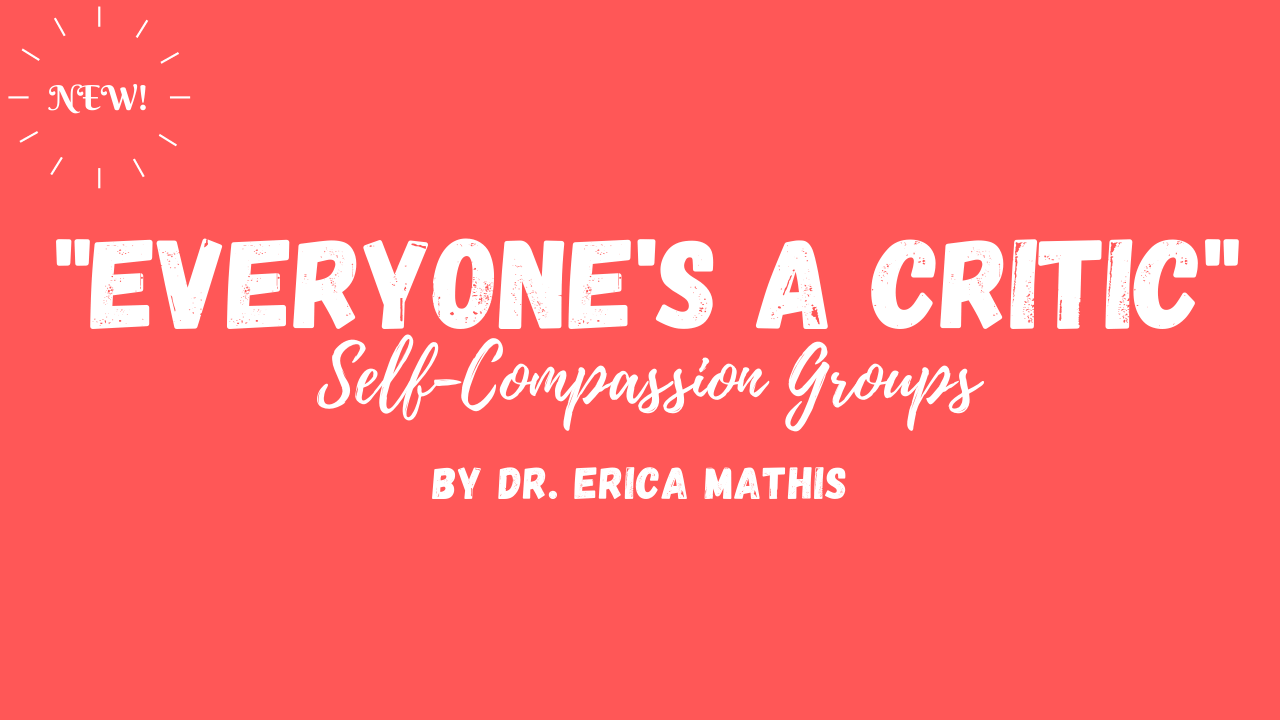All of us struggle with insecurities and doubts. We tend to criticize ourselves for our flaws, judge our shortcomings, and deny ourselves the grace and love we so freely give others. The need for perfection and performance drives us to the brink of burnout, leaving us feeling overworked and unfulfilled.
But it doesn’t have to be that way.
You deserve a chance at self-love and kindness. You deserve care and compassion, just like everyone else. And, you deserve a space to learn how.
We are excited to introduce a new psychotherapy group, “Everyone’s a Critic!” led by Dr. Erica Mathis. This group will focus on helping members increase self-compassion by developing kinder relationships with themselves. If you are interested and ready to sign up, contact us today!
Why is self-compassion important?
Imagine living in an apartment complex with a noisy upstairs neighbor. You might feel frustrated or angry with them – how dare they intrude on your peace and quiet? You might complain to the building managers or put passive-aggressive notes on their door. You may even thump your broom on the ceiling in the hopes that they’ll quiet down.
But, if you took a moment to connect with your neighbor, something might change. You might realize that they walk with a cane and that it’s hard for them to move around quietly. You may discover that they are lonely or that your broom-thumping startles them. The two of you could learn to be friends, to take better care of one another, and live in harmony.
When we lack self-compassion, we are essentially disconnected from ourselves. We treat ourselves like the upstairs neighbor – angry, bitter, and even aggressive.
Self-compassion gives us a path to self-connection, self-love, and inner peace. And when we do that, life gets a lot better.
Numerous studies have demonstrated the benefit of self-compassion work, as self-compassion is directly related to stress, self-criticism, depression, and anxiety (e.g., Ferrari et al., 2019).
Who should join a self-compassion group?
Self-compassion groups (like “Everyone’s a Critic”) are particularly effective for people who:
- Struggle with self-worth and self-esteem
- Feel overworked and/or burned out
- Struggle with intimacy in relationships
- Are grieving the loss of a loved one
- Lead teams or organizations
- Want to learn to connect with themselves and others
How can boosting my self-compassion help?
While these outcomes sound great, you may be asking yourself, “how would I work on increasing my self-compassion?” Great question! There are many areas to explore when working on self-compassion, but some things you can expect to focus on in this group are:
Increasing mindfulness of difficult emotions
There is a saying in psychology: “what we resist persists.” Often, we feel the urge to avoid or control our emotions, especially those we perceive as “negative” (like anger, jealousy, and sadness). We believe this will protect us from feeling bad or uncomfortable. However, attempting to control or avoid our feelings prolongs the experience of the uncomfortable emotions – which is exactly what we are trying to avoid! Additionally, attempting to avoid or control emotions prevents us from recognizing what we are truly feeling and thus robs us of the opportunity to respond to our feelings with self-compassion.
Addressing the inner critic
Does it often feel that your inner critic is “winning?” While we tend to avoid or control our difficult emotions, we tend to give much power to our inner critic! It can be helpful to take a step back and figure out what your inner critic is trying to convey to you. For instance, many individuals feel that they must remain self-critical to maintain motivation and avoid things like laziness or complacency. However, most of what our inner critic does is simply make us feel bad without the outcomes we hope for.
Increasing acceptance of our mistakes
Tough one, huh? Accepting our mistakes can be difficult for a number of reasons – maybe mistakes make you feel guilt-ridden, or maybe accepting that you have a made a mistake is scary because then you have to do something about it! The truth is though, we are all human and we all make mistakes. Much like the aforementioned topics, accepting mistakes is crucial to developing a self-compassion practice. You can’t extend compassion to a mistake you have not accepted.
Increasing self-forgiveness
Another difficult one! Echoing the previous points – most of us tend to really give ourselves a hard time and we often do not instinctively engage in self-forgiveness. Similar to self-criticism, many of us struggle with engaging in self-forgiveness because we believe that “letting ourselves off the hook” will lead to chronically “giving ourselves a pass.” This is not the case, although I know changing this practice is easier said than done! A quick way to assess your level of self-forgiveness is to ask yourself, “would I be more forgiving to a friend about this mistake than I am being to myself?” Most of the time, the answer is yes. In our group, we will work to help members extend themselves the same forgiveness that they extend to others.
Exploring new, self-nurturing behaviors
So far, all of these points have been about changing your mindset and exploring what existing barriers you have to self-compassion. In the group, we also want to work on what new experiences you want to add to your self-compassion practice. This is probably not a surprise – we tend to do a not-so-stellar job of nurturing and soothing ourselves. Therefore, we need to intentionally explore and practice what behaviors (whether something we engage in mentally or physically) feel nurturing and soothing to us so that we feel cared for by ourselves.
Why is learning self-compassion done in a group setting?
Working on self-compassion in a group setting can be truly transformative. The works of self-compassion experts Dr. Kristin Neff, Dr. Christopher Germer, and Dr. Brené Brown all highlight the importance of sharing our experiences with others, recognizing our common humanity, and extending compassion to others as key pieces of self-compassion work.
Group therapy provides a setting in which to practice these pieces of self-compassion work, all with other individuals who share a common goal of being kinder to themselves and those around them.
How do I get started?
Did you read something in this post that resonated with you? Feel like you may benefit from self-compassion work with others sharing the same goal?
Let us know! Contact us today to get started.

